Almost 24 Hours and Still No Deal: Merkel Struggles to Clinch Govt Accord

AFP
Chancellor Angela Merkel was struggling to find a coalition deal with Germany's second biggest party, as a last-ditch round of negotiations stretched well into overtime Friday with "big obstacles" left to clear.
After almost 24 hours of marathon talks, there was still no agreement in sight between Merkel's conservatives and the centre-left Social Democrats (SPD).
Questions surrounding Germany's 2015 record refugee influx as well as issues related to the country's finances were key sticking points even as Europe's biggest economy posted healthy growth for 2017 and a record surplus.
With parties digging their heels in, the meeting was proving to be long even by Merkel's standard.
The veteran of all-night haggling in Brussels had seen through tough talks on Greece's debt and peace negotiations for east Ukraine, but none have dragged on quite as long as the latest session that began at 8am (0700GMT) on Thursday.
But Merkel knows what is at stake.
After September's inconclusive elections left her without a majority, the veteran leader's first attempt at forging a coalition with smaller parties had collapsed in November.
She now desperately needs to get the SPD to renew an alliance with her conservatives if she is to salvage her political future.
Merkel had warned early Thursday that it would be a "tough day" of talks.
SPD leader Martin Schulz also spoke of "big obstacles" on the last day of preliminary talks in which the parties were sounding each other out over whether to move on to formal coalition negotiations.
In fact, not only is Merkel's career on the line, but also Schulz's and that of Horst Seehofer -- the leader of Merkel's Bavarian allies, said political analyst Karl-Rudolf Korte of Duisburg-Essen University.
"The negotiations are not just about a coalition, but also their careers. It would be the end for all three if this coalition does not come about," he told public broadcaster ZDF.
- Haggling over taxes -Germany's economic health has stood in stark contrast to the political paralysis, which has entered a fourth month.
In fact the political talks were tripped up by the country's strong finances, as parties had opposing views on how to manage the cash.
Seeking to push its social welfare agenda, the SPD is demanding greater relief for the lower and middle income brackets while seeking tax hikes for top earners.
But the conservatives had campaigned on a programme of "tax cuts for all".
Beyond fiscal and spending issues, the parties are struggling to fend off the encroaching far right, which has seized on anger over the influx of refugees and netted a record showing at the polls in September.
To halt a haemorrhage to the far right, Merkel's alliance wants a tougher stance on immigration, something that is hard to sell to the centre-left SPD.
- 'Scepticism justified' -Even if negotiators find a deal, it can still be torpedoed when SPD delegates and later rank-and-file members get to vote on whether the traditional labour party should once again govern in Merkel's shadow.
Scepticism is high within the party about joining hands again with Merkel after the SPD scored a humiliating result in September's election.
The SPD's youth wing chief Kevin Kuehnert told Zeit Online that he would embark on a national tour to press his case to opposing a new grand coalition before a September 21 party congress.
"The mood of the party rank and file with regards to a grand coalition is still grim. That's why I think we have a good chance," said Kuehnert.
Gustav Horn, macroeconomic policy expert at trade union-related foundation Hans-Boeckler, said for any coalition deal to succeed, the SPD's leadership needs "something tangible to put to their members where they can say 'those are SPD policies, and that's why we're going into this grand coalition'".
"If that doesn't happen, then Martin Schulz will have great difficulties... to convince party members of the necessity of this grand coalition," he said.
Surveys suggest that there is little appetite for a new conservative-SPD alliance.
A survey published by Focus magazine found that only 30 percent of Germans favour a return of the grand coalition, while 34 percent prefer new elections.
Another poll, published by public broadcaster ARD, found that only 45 percent viewed a new GroKo positively, while 52 percent did not.
And a third survey, for business paper Handelsblatt, showed that 56 percent believed Merkel would not see out her four-year term.
Latest News
 King orders holding parliamentary elections in accordance with law, checks on electoral commission’s preparations
King orders holding parliamentary elections in accordance with law, checks on electoral commission’s preparations- N. Macedonia starts elections that could decide stalled EU talks
 US Senate passes bill for aid to Israeli Occupation, Ukraine, Taiwan
US Senate passes bill for aid to Israeli Occupation, Ukraine, Taiwan Safadi discusses support to Syrian refugee with DRC
Safadi discusses support to Syrian refugee with DRC Israeli Occupation aggression on Gaza enters 200th day
Israeli Occupation aggression on Gaza enters 200th day
Most Read Articles
- Palestinian prime minister, Jordanian ambassador discuss humanitarian efforts in Palestine
- US president signs bill to provide new aid for Ukraine
- Prime minister directs government to support IEC ahead of upcoming elections
- Iran cuts Syria presence after strikes blamed on Israel —monitor
- US Supreme Court seems split on Idaho abortion ban
- Four dead as floods wreak havoc in Kenyan capital
- UAE announces $544m for repairs after record rains
- Vaccines saved at least 154 million lives in 50 years — WHO
- Germany nudges up growth forecast, ailing economy at 'turning point'
- Israel pummels Gaza after US Congress approves military aid